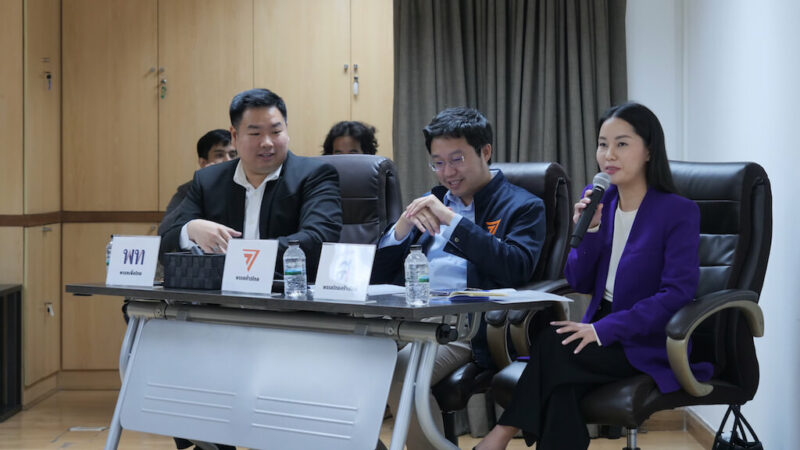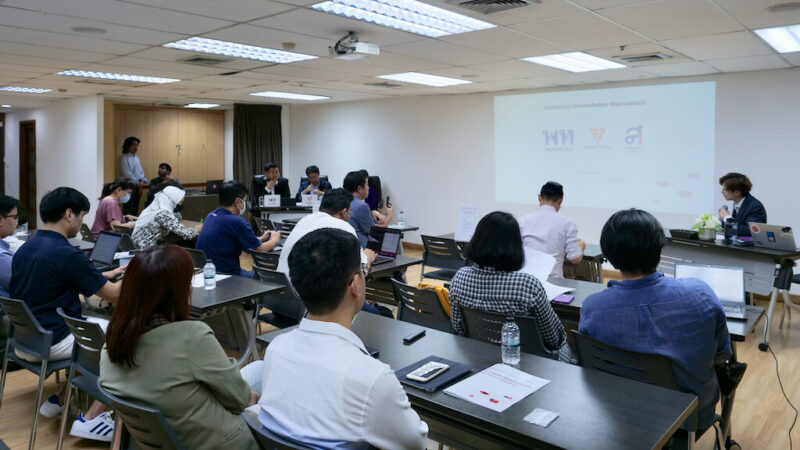
Representatives from three major political parties attended the launch of the 4-Point Digital Rights Agenda. From left to right: Sarun (Pheu Thai Party), Woraphop Viriyaroj (Move Forward Party) and Thidarat Yingcharoen (Thai Sang Thai Party). Photo from EngageMedia, used with permission.
This article was originally published by EngageMedia, a non-profit media, technology, and culture organization, and an edited version is republished here as part of a content-sharing agreement with Global Voices.
Ahead of the upcoming general elections in Thailand, political parties committed to recognising and incorporating the protection of digital rights in their agenda, during the launch of a report by EngageMedia, Asia Centre, and Chiang Mai University’s School of Public Policy on February 24.
The report, entitled “4-point Digital Rights Agenda for Political Parties,” highlights key digital rights issues that merit immediate attention and action from political parties to commit to upholding digital rights in Thailand. Representatives from three political parties, 22 members of civil society organisations and non-government organisation networks, and four press agencies attended the conference.
EngageMedia's digital rights project officer for Thailand, Prapasiri Suttisom, presented the report’s salient points, emphasising the importance of upholding freedom of expression, promoting access to information, protecting privacy rights, and fighting online disinformation.
Following the presentation, Ruchapong Chamjirachaikul, advocacy officer at the Internet Law Reform Dialogue (iLaw), moderated a roundtable discussion to allow participants to exchange feedback and further recommendations from the report.
Response of political parties
Following the presentation of the report, the Pheu Thai Party (PTP) said it would incorporate the recommendations as part of the party’s human rights policies. PTP acknowledged there is a pattern in which the ruling government uses vaguely-worded laws to suppress fundamental freedoms and there is also a consensus among progressive parties to amend these draconian laws. Commenting on the issue of access to information, party representative Sarun said that most government agencies prefer to cling to their organisations’ by-laws rather than adjusting to the Electronic Administration Act (2022), which mandates the adoption of digital processes as part of the government’s digital policy.
For its part, the Move Forward Party (MFP) agreed with the report’s content and key recommendations, adding that the party has always prioritised the protection of human rights. According to party representative Woraphop Viriyaroj, MFP believes that power belongs to the people and that democratic governance would not work if accountability, and by extension, freedom of expression, could not be guaranteed. Speaking on the issue of privacy rights, Woraphop Viriyaroj vehemently condemned the use of taxpayers’ money on state-sponsored surveillance tools that target human rights defenders and vocal government critics.
Meanwhile, the Thai Sang Thai Party (TSTP) said the report’s recommendations were precise and inclusive, and align with the submissions made by CSOs as part of Thailand’s first Universal Periodic Review. Party representative Thidarat Yingcharoen said that the TSTP sides with the local democratic movement and considers digital rights as fundamental rights. On freedom of expression, Thidarat said that while the party has not internally discussed calling for the possible amendment to Articles 112 and 116 of the country’s Penal Code, TSTP agrees in principle that the law should not be used to criminalise freedom of expression. [This refers to the anti-royal insult law.]
To safeguard digital rights, the three parties agreed that a proper balance between government control and Big Tech business operations is needed to give social media users more freedom, instead of restricting their access to online content.
Prachatai journalist Sorawuth also raised concerns over the rights to access information. He called for a parliamentary mechanism to facilitate the digitisation of government data to make this critical information more publicly accessible. He also called out Big Tech companies like Google, which refuses to provide traffic data to human rights defenders for their court cases against state-sponsored disinformation campaigns.

The gathering of political parties, civil society organisations, and press agencies in one room to discuss digital rights showcased the power of collective action towards ensuring an inclusive and equitable digital landscape. Photo from EngageMedia, used with permission.
Multi-stakeholder approaches are critical
During the conference, participants stressed the need for collaboration and the involvement of a broad range of stakeholders to jointly ensure the protection and promotion of human and digital rights. Poomjit Sirawongprasert, the president of the Thai Hosting Service Providers Club, proposed cooperation among political factions in Thailand to establish a multi-stakeholder model that will facilitate digital and internet governance. She highlighted the example of the distinct governance model of the Internet Corporation for Assigned Names and Numbers (ICANN), which incorporates decentralised control, bottom-up decision-making, inclusivity, and participation, with a particular emphasis on community input alongside that of powerful entities.
Thanisara Ruangdej, CEO of civic tech organisation WeVis, requested clarity from the parties’ representatives on the extent to which civil society is consulted when policies are conceived and planned. She noted that while there are difficulties in integrating human rights policies in election campaigns, these issues and policies should be discussed publicly during the period leading up to the election.
The conference ended with discussions and brief presentations from WeVis about their work on promoting transparency and raising public awareness of election issues through the “Promise Tracker,” followed by iLaw’s introduction of the Vote62 initiative, which aims to crowdsource election results as part of the election observation mechanism.
The connection between civic technology and civic empowerment has the potential to affect positive change and advance openness, responsibility, and engaged citizenship. Through collaboration with the government, digital rights advocates, and other stakeholders, technology can be used to support a more just and equitable society, where digital rights are upheld and everyone is given the chance to engage in civic life fully.
Thailand's general election is scheduled for May 14, 2023.



